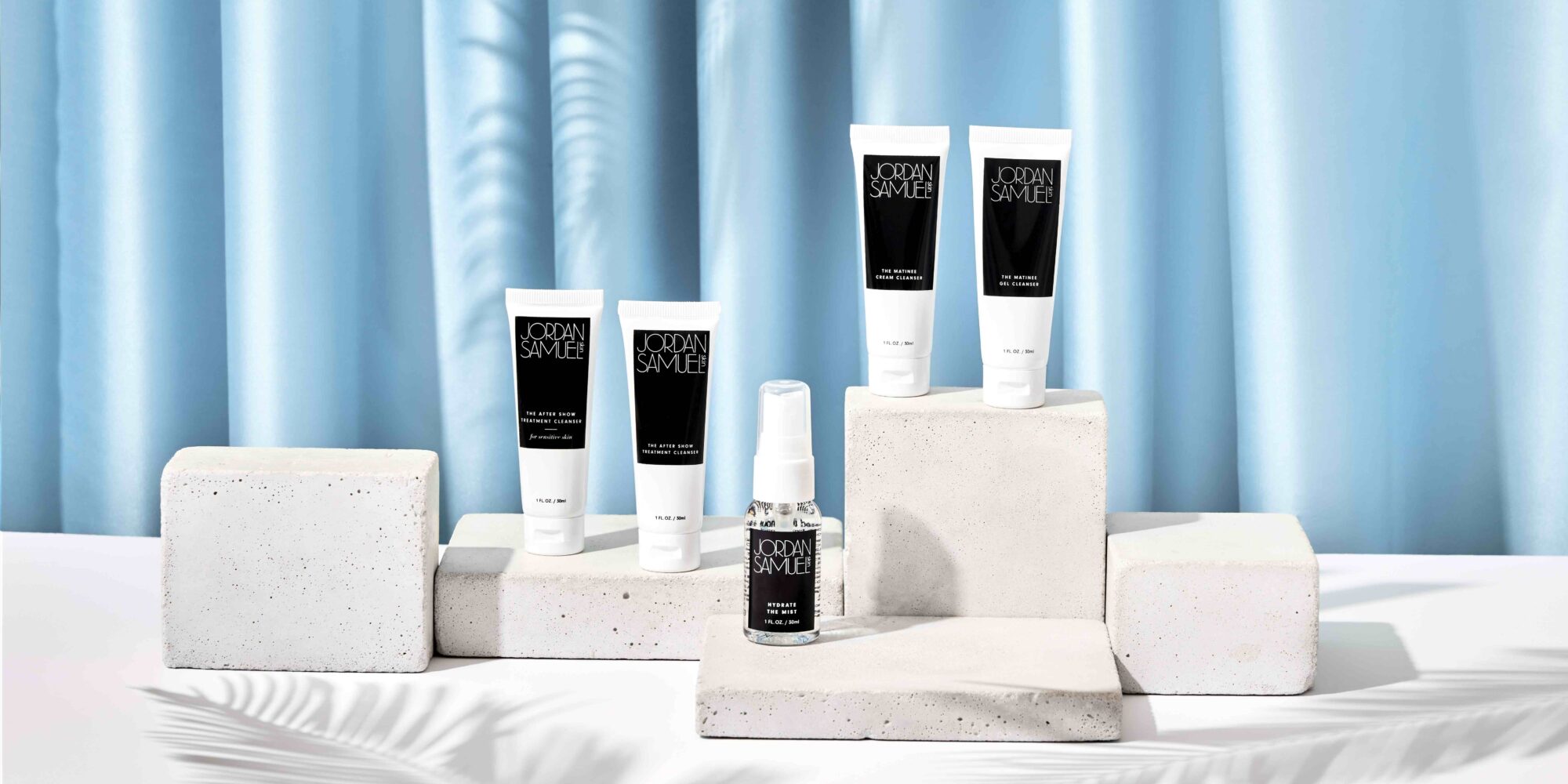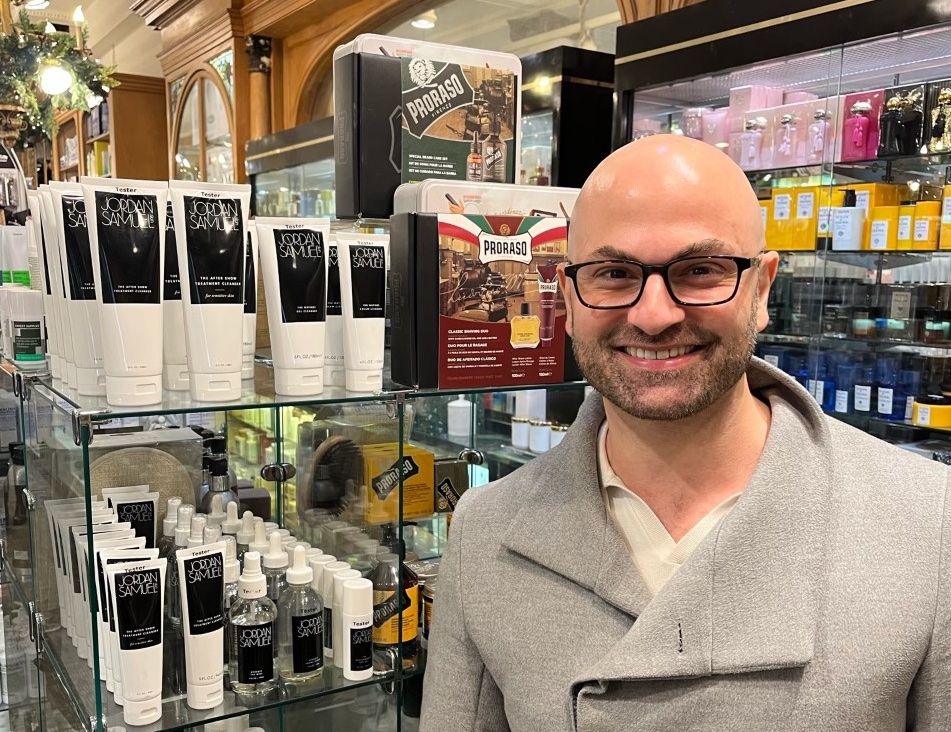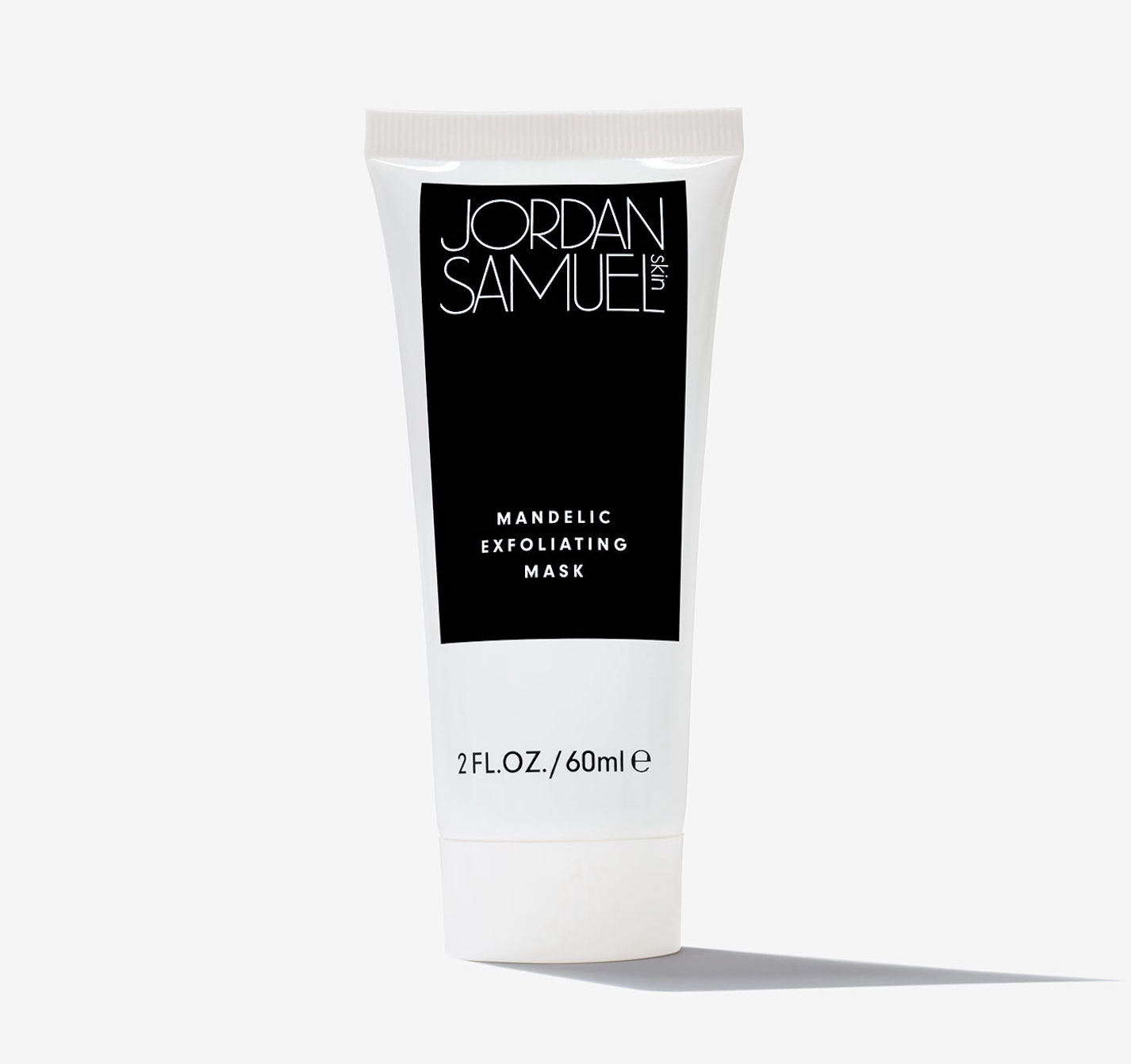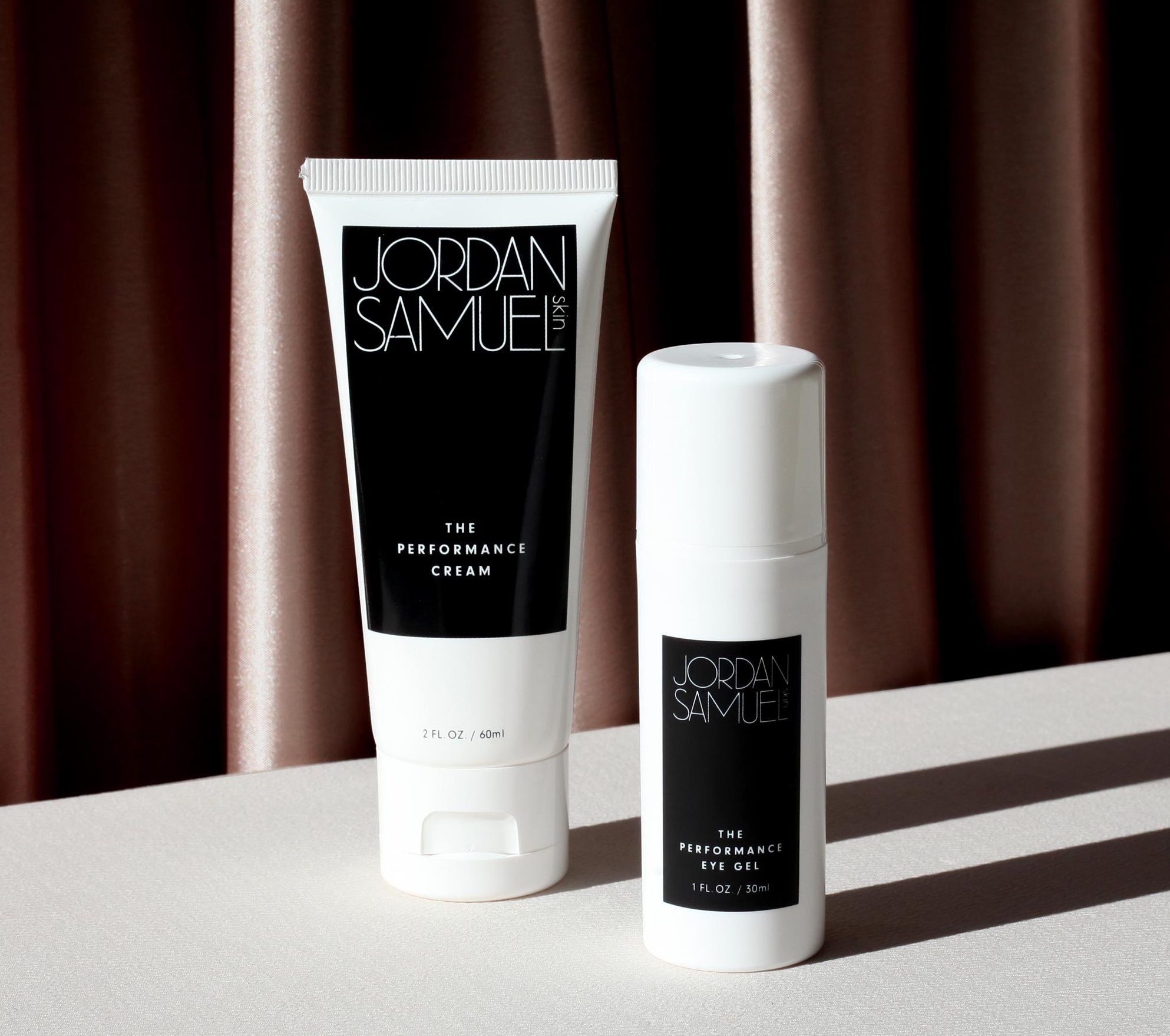
Why Jordan Samuel Skin Is Sticking With A DTC-First Approach Even As It Falls Out Of Favor
In 2020, nearly seven years after Jordan Samuel Pacitti, a ballet dancer-turned-aesthetician and former Kate Somerville trainer, started Jordan Samuel Skin, the brand branched out from its website for the first time to British e-tailer Cult Beauty. Now, as the brand nears its 10th anniversary, it’s branched out to brick-and-mortar retail for the first time by entering New York pharmacy mainstay C.O. Bigelow.
The gradual expansion is intentional. Similar to his deliberate approach to skincare, Pacitti isn’t interested in an enormous distribution push that causes an immediate sales rush followed by a subsequent crash. “I truly feel like the tortoise rather than the hare,” he says. “We make sure we aren’t biting off more than we chew with anything, whether that’s with retailers, employees, product launches, etc.”
Today, as Jordan Samuel Skin stretches beyond its site, it remains committed to selling its products via its direct-to-consumer presence. It has 13 core items priced affordably for a prestige skincare brand from $12 to $47, including bestsellers Moisture Recovery Cream, The Matinee Gel Cleanser and The Performance Eye Gel. In 2019, Jordan Samuel Skin nudged up against $1 million in sales, six years after it initially broached profitability, and aims for a 30% revenue increase this year.
Beauty Independent talked to Pacitti about slow and steady growth, consumer fatigue, the anti-trend trend he’s watching, positive aspects of reformulations, and his brand’s aesthetician program, international reach and ultimate goal.
We spoke last in 2020 when Jordan Samuel Skin entered Cult Beauty. What’s happened since then?
We have stayed true to many things. One is that we haven’t taken on any investment. That has been strategic. We don’t not think about it, but we know we can do what we are doing without taking on investment.
We keep the authenticity of the brand and grow slower than others because of that, but we are also growing purposefully and have flexibility in the products we bring to market or discontinue. That’s not to say that if you have an investor you wouldn’t be able to do that, but obviously you have more cooks in the kitchen with investors.
We are no longer an entirely direct-to-consumer brand. However, we are primarily direct. We are always looking to improve upon our direct business while fostering our other relationships still with the focus on the direct business.
Why have you started wholesaling to aestheticians?
I’m an aesthetician and then a brand founder. I’m always about helping people with their skin. I find having that direct business the way best way to do that is education. I’m always on Instagram doing Tuesday Talks, and I do YouTube videos just trying to help people with their skin and understanding how to use our products and other brands’ products. I’m sure there are people, but it’s a very small percentage, just using one brand’s products exclusively, but because most aren’t, I like to honor that with customers and to work the products they are using with ours in their routines.
We started the wholesale small spa aestheticians’ program in October 2021. When you have a facialist using the products on customers’ skin, they will be able to see firsthand how the customers’ skin is reacting. They can sample the customer on our product and make sure it’s working in the customer’s routine.
We didn’t want a huge blast and have 50 spas sign up right away. I think we have 10 spas now. We wanted to be able to educate the aesthetician practices on our products and walk through any questions they have. I can do one-on-ones with aestheticians so they are truly getting an understanding of the products, and they are able to pass that on to customers. Brands don’t want returns. I hope to have happy customers and a happy business.
Early on in my career at Kate Somerville, people would say, “You are doing great numbers, but you are only selling five to 10 products at a time.” I was like, “That’s what I want because the customer is going to come back.” The buy-in for some lines were outrageous, like $15,000. That might make sense if you are large spa with 20 treatment rooms. Obviously, if you are a one- or two-room facial space, having a buy-in of $15,000 is crazy.
We do a $450 minimum. I know there are more affordable minimums out there, but there are also much more outrageous ones. We do the minimum based on what we have in terms of SKUs. On average, that is five SKUs of every product in the full size. Of course, they don’t have to be buy five of each, they can buy 20 of one.
In our direct business, we have global shopping partner Global-e. You need certain benchmarks to be able to utilize this company, but, when you shop on our site, you can shop in your currency and in your language. Orders are shipped from our warehouse in Iowa, get to your country in two to five days, and the shipping rates are unbelievably competitive.

How much of your business is international today?
Now that we have Cult Beauty and this international shipping option on our website, it’s probably a 70%/30% split U.S./international. It’s smaller than our U.S. market, but it’s up there where it’s closing in on 50%/50%, thanks of course to Caroline Hirons. We have huge interest in the U.K. because of her, but she’s huge all over the globe. Because of her and the international interest, our latest partner is Lulu, and we will be selling in Kazakhstan and Ukraine.
Outside of spas, you have three partners: Cult Beauty, Lulu and C.O. Bigelow. Has selecting a few partners been the plan?
We don’t want to be everywhere all at once and not able to nurture these relationships. C.O. Bigelow is our first brick-and-mortar retailer, and it’s purposeful that it has one store. They are down the street from me in New York, and I can educate and train them. We are not going to get into the pattern of adding a retailer in every city because it will diminish what we do.
It’s the same internationally. We only took on this new retailer after we had Cult Beauty down. With Lulu in Kazakhstan, they are acting as a distributor. I trained them for hours, and they are able to help us with the language barrier and getting into their stores. We said upfront to Lulu that we don’t want to go gangbusters out of the gate. We want to go slowly and purposefully.
We did this with Cult Beauty, too. We said, “If you want outrageous numbers we can’t produce, this isn’t going to be advantageous for either of us.” We are small and steady with our retail partners international and domestic, but growing. We aren’t going backward or staying stagnant.
What about future brick-and-mortar retail expansion?
There are no plans currently for other brick-and-mortar expansion. We want to grow our relationship with C.O. Bigelow, especially with me being here. I can do in-person events and facials. Our biggest goal for this year and the next few years is still to build our direct business, making it quicker for customers to receive their products, doing more with gift-with-purchases and finding ways for people to trial the products if they don’t have access to them.
One thing we started doing more of is lower threshold gift-with-purchases. That’s not necessarily getting new customers, but, for our current customers, they may have purchased one product, and they’re able to try a second or a third. A lot of people have never tried our cleanser, but people fall in love with it when they do.
One thing I’ve seen the brand Elemis do is, for the price of shipping and handling, you get a luxury travel size. Usually an influencer is involved in the promotion, and a customer goes to the website with a code to trial the product. It’s something we would like to do because it opens the door for people who haven’t experienced the product in person, so are apprehensive about taking the plunge. When they’re able to trial a product just for the cost of shipping, we can get new customers who have been looky loos for the last few years.
Another thing is events, not just at C.O. Bigelow, but meet-and-greets if I go to LA, San Francisco, London or somewhere else. We did one in London when we launched with Cult.
What was your most recent product launch, and what launches do you have on the way?
It was our Mandelic Exfoliating Mask. What I love about that product is it is the epitome of our philosophy. It’s our first mask, and it’s a slow and steady product. It’s a gentle exfoliator, and it’s not a leave-on product. It’s not going to irritate the skin. It’s a product for people who have been left out of the alpha hydroxy acid conversation because they feel it’s too much for their skin.
Our Hydrate Facial Serum is getting repackaged with a slight formulation this year. When we reformulate, it’s to make a product better by upping a percentage or getting a better supplier. Our Retinol Treatment Oil is also getting a slight reformulation and packaging upgrade. Our Antioxidant Serum has been essentially discontinued because the reformulation of it is going to be wildly different. It’s a vitamin C-free antioxidant serum.
One thing we are looking at over the next few years is not changing the packaging, but getting upgrades on the packaging where we can now have better minimums. There has been great progress accommodating smaller businesses with eco-friendly options, and we are taking advantage of that. When you change packaging, you have to go through stability and compatibility all over again, so that takes time.

What drives you to reformulate?
It could be feedback on packaging or the formula or a chemist will come to us and say, “I have this new ingredient, and it’s amazing.” I might think, “Oh, that’s really great, but that would be for a serum that’s comparable to something in our line.” Instead of doing that, I see if we can work that ingredient into an existing product and upgrade.
There’s a lot of talk when companies start to reformulate, and people have likened it to a negative, but I will bend over backward to make a product better. In our Retinol Treatment Oil, I’m removing the sweet almond oil. There are certain people who can’t use it topically. We are replacing it with safflower oil. You don’t have the nut allergy situation, and it’s friendlier for oily skin. We are tweaking it to be more beneficial for more skin types.
What’s it like to be a DTC brand today when the DTC boom has ended?
I love people’s takes on it. The answer depends on what your goal is. How much are you trying to grow? Are you truly nurturing that side of the business? For us, our direct business is super strong. We’ve gone up each year.
Could it have been more? Nobody has a Magic 8 Ball to know. When COVID hit, people were starting to pull out of retailers and having to reinvent their direct business. Our customer was already there, and we had our warehouse purposefully in the middle of the country so people could get their products quickly.
As we grow and increase visibility in line with what we want to do, we think omnichannel makes sense. However, it’s going to be slow and steady. We have turned down major retailers before because they wanted us in every door, and that doesn’t make sense for us. For each brand and each part of the business, where you give attention, the grass will grow.
We know that we can’t put all of our eggs in the direct basket, but we do know that, because we have nurtured it and it’s been our bread and butter, that helps. But we would not be the size we are without Cult Beauty, the spas and C.O. Bigelow. We understand they are helping us grow, but it’s our direct business that’s still our bread and butter and will continue to be.
Is there skincare consumer fatigue?
I would say fatigue is real. It’s definitely happening. In our weekly meetings, I think about, how can we have our customer not be fatigued? How can we excite them? There’s been a slew of celebrity skincare lines. Then, sometimes they leave as fast as they come. That’s obnoxious. I’m an aesthetician first. To me, it’s more than a business, it’s truly my career. I’m helping people’s skin, it just so happens that I really like having products, too.
People are simply overwhelmed with what to use and what to do. Some brands are doing multiple launches a month. It starts with a little bit of FOMO because there are shiny new products or brands, and then it becomes fatigue. For me and our brand, the challenge is how do we avoid that with our customers. How do we lure in a new customer who’s fatigued already? I don’t have the answer to that because that’s the million-dollar question currently.
What do you think of the rise of doctor and other authority brands?
I love the idea of authority brands. The side bar, though, is that whether it’s a doctor, aesthetician or chemist brand, it can have bad marketing. It doesn’t give people a free pass.
And people can still make mistakes, lord knows I have spoken out of turn, but, in general, I love it. Obviously, going to school, being an aesthetician, doing facials and being in the industry before I launched the brand, when a customer comes with question, I have that authority and understanding to truly be able to help them with their skin. I don’t think it’s 100% necessary, but I love that it’s the current trend.
I’ve always been somebody that looks to a dermatologists’ or aestheticians’ brands. I love Kate Somerville, Joanna Vargas, Shereene Idriss, Nerida Joy, Renée Rouleau, Dr. Perricone and Dr. Gross. It just makes sense. Chemist Confessions, I love them, too. When I’m on a plane, I want the pilot to have a lot of experience. That might be a terrible analogy, but you get the point.

Do you think consumers expect skincare to work too quickly? How do you think their expectations are changing?
Now, especially with these aesthetician-, doctor- and chemist-led brands, where people can really speak on the results, people will see the timeline. All of us doing that is collectively helping the greater good.
People’s expectations aren’t necessarily too high, they are essentially just impatient. They might be able to get a great result from a product, but that product needs to be used consistently every day for four to six weeks, and what usually happens is people use it for two to three days, and then they toss it to the wayside.
On social media, people often see someone else’s success, but not the work put into it. It’s the same with skincare. You have to be consistent, then you get the prize at the end. In my videos what I say a lot is, “Over time, not overnight.” I have to keep reiterating that, but I think customers have started to get it.
What trends are you watching?
I’m so anti-trend in the skincare industry. For a while, it relied on ingredients, and people would talk about the trendy ingredient. But niacinamide isn’t a trendy ingredient, it’s been around forever. With barrier repair and skin barrier health, it was the first time a trend aligned with our brand.
What I’m watching is customers understanding that results come from using the same product consistently and being very methodical with their routines, not having 52 cleansers to choose from, but two. I don’t know if that’s completely happening just yet, but we are getting there. With more of the doctor, aesthetician and chemist brands having similar messages, that might collectively start to happen.
What’s the ultimate goal for Jordan Samuel Skin?
Being where we are today, just larger with more employees, improved packaging and growth in the product line. I always say that, if someone came to my door with an offer we couldn’t refuse, we wouldn’t necessarily turn it away, but we are not looking to scale and sell. So, it’s truly to grow purposefully over the next decade and still be doing what we are doing.





Leave a Reply
You must be logged in to post a comment.